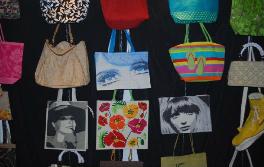
National Jute Board (NJB) is actively engaged in market development of jute products and as part of its promotional activity, a ‘jute festival’ is being organized at Chennai.
Nearly 35 jute entrepreneurs from different states like Tamil Nadu, Andhra Pradesh, Karnataka, Kerala, Puducherry, West Bengal, Uttar Pradesh etc. are showcasing their products like jute blended saris, jute tiles, floor coverings, wall hangings, jute handicrafts, various kinds of bags, home textiles, jute stationery articles, gift articles, footwear etc. Every evening a ‘jute fashion walk’ is also being organized as part of the expo.
Prerana Lifestyle of Thrissur, which is an SHG initiative, has a wide range of bags and folders which it claims to supply to many corporate customers. Jute Emporium has displayed an amazing collection of bags, clocks and time-pieces with jute dial, wall hangings and other decorative items.
Anakaputhur Jute Weaver Association has showcased an interesting variety of jute blended saris which are attracting the women folk. C. Sekar of the association says these jute saris are chic and more durable. Reliance Handloom Crafts of Warangal, AP manufactures jute durries of various sizes.
Favourites from Palladam has displayed jute floor coverings and tiles besides wall hangings and serving trays of varying sizes. Kiran Bag of Kolkata has a delightful range of jute footwear, which is light in weight.
The exhibition is attracting large crowds looking for eco-friendly and fashionable ethnic product range. Besides creating awareness on jute as an eco-friendly product, the exhibition is also attracting domestic entrepreneurs interested in diversifying their business activity.
Jute is one of the oldest sectors in India’s agricultural and industrial economy. India is the largest producer of raw jute and jute goods. Export performance of jute sector crossed US$ 383 million during 2011-12. This year’s target has been set at US$ 500 million. The exports included diversified products like jute floor coverings, wall hangings, decorative fabrics.
There are 83 composite jute mills in the country producing jute goods to the extent of 16 lakh metric tonnes. The industry is an agro-based and labor intensive, providing employment to about 2.48 lakh workers directly and indirectly.
The main advantage of jute lies in its eco-compatibility. Jute, the golden fibre, meets all the standards for ‘safe packaging in view of being a natural, renewable, biodegradable and eco-friendly product. As a natural fibre, it is finding greater acceptance as an environment friendly product since its contents are cellulose and lignin, which are biodegradable. With growing concern for environment and ecology, the global trend of opting for natural products in various sectors holds bright prospects for the jute industry.
National Jute Board (NJB) under the Union Ministry of Textiles has undertaken various programmes for promotion of jute. NJB represents the interests of growers, workers, producers and exporters. NJB also undertakes various measures for promotion of jute and jute products in the country as well as export markets abroad. The sustained efforts of NJB have resulted in increase of enterprises in the informal sector and consequently more employment.
Ministry of Textile





